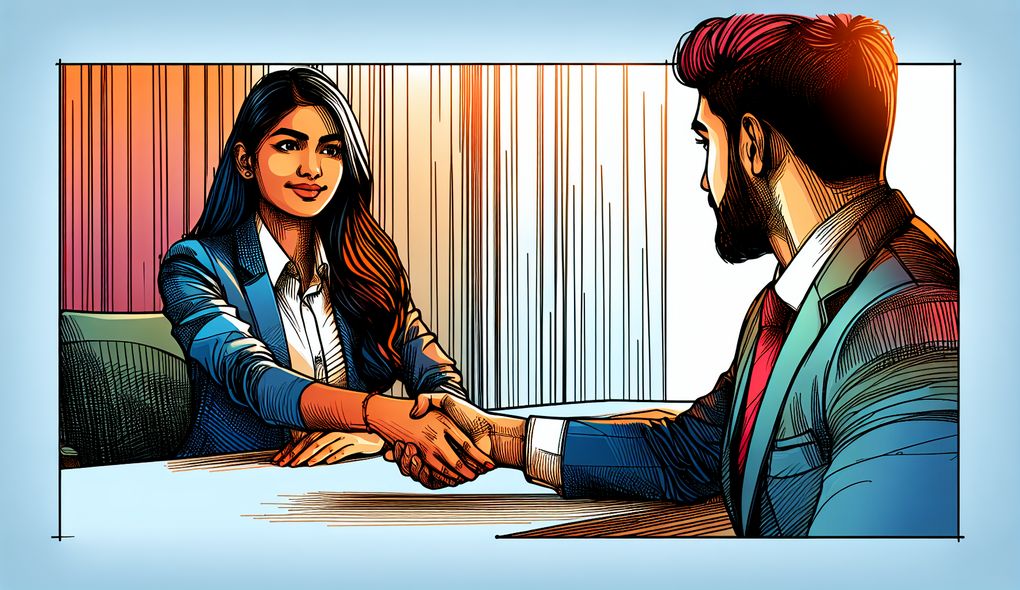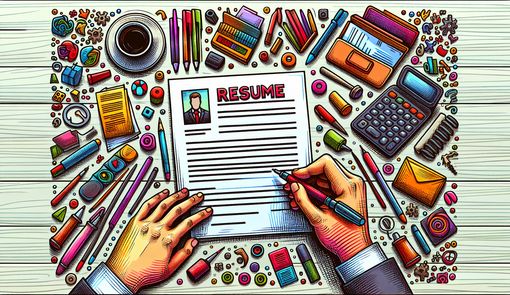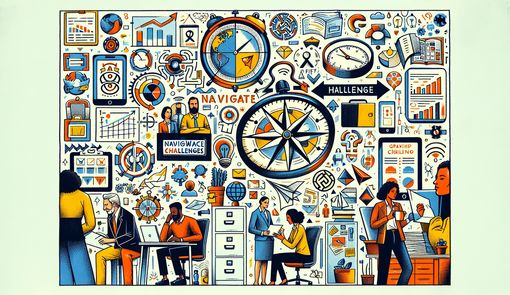The Art of Closing an Interview on a Strong Note
Discover the techniques to effectively conclude an interview, leaving a lasting impression on your potential employers.

Closing an interview effectively is just as critical as the first impression you make when you walk through the door. The final moments are your last chance to leave a lasting impression on your potential employer and can sometimes be the deciding factor in whether you land the job.
Understanding the Importance of Interview Closure
The end of an interview often involves a delicate dance where job seekers must convey their enthusiasm for the role, reinforce their qualifications, and express their fit for the company culture, all without appearing desperate or disingenuous. Mastering this balance can mean the difference between a job offer and a rejection.
The Final Impression Factor
What you do and say in the closing moments of your interview are often what the interviewer remembers the most. Behavioural psychologists note that the 'recency effect' comes into play during interviews. This principle suggests that the most recent information we process is often the most easily remembered. Therefore, a powerful ending to your interview can resonate more broadly than any single answer you provided during the session.
Strategies for a Strong Interview Close
Reiterate Your Interest
Before the interview wraps up, explicitly express your interest in the position and the company. Mention specific aspects of the job or company culture that resonate with you, drawing a clear connection between these factors and your own experience or aspirations.
Summarize Key Points
Sum up your relevant skills and experiences that make you a strong candidate for the position. This recap serves as a powerful final impression and provides the interviewer with a condensed list of reasons why you should be hired.
Address Any Reservations
If during the interview you sensed any hesitation or concerns from the interviewer, use the closing to address these points head-on. Offer additional information to offset any doubts and demonstrate your ability to be reflective and responsive to feedback.
Ask Insightful Questions
The questions you ask at the end of an interview can demonstrate your critical thinking and genuine interest in the role. Prepare a list of thoughtful questions to ask that go beyond the surface level and show that you've done your homework.
Express Gratitude
Always thank the interviewer for their time and the opportunity to interview. This shows respect and appreciation, which will always be remembered favorably.
Confirm Next Steps
Ask about the next stages in the hiring process and when you can expect to hear back about their decision. Request contact information if you don't already have it, so you can follow up appropriately.
Common Mistakes to Avoid at Interview Close
- Ending Too Quickly: Don't rush the close. It's important to take the time to go through the above steps mindfully.
- Being Too Pushy: While expressing interest is important, don't cross the line into being aggressive about your chances of getting the job.
- Ignoring Red Flags: If something didn't sit right with you during the interview, don't ignore it. Consider this in your overall assessment of the job opportunity.
- Forgetting to Follow-Up: Sending a thank you email or note after the interview reinforces your interest and keeps you top of mind for the interviewer.
Conclusion and Action Items
Your parting words and actions in an interview set the tone for how you'll be remembered. Be sure to leave on a positive and thoughtful note. As a final piece of advice, practice your closing remarks before the interview. Just like the beginning, have a clear script in mind for how to end the interview. This will help you avoid fumbling for words and ensure you leave the interview on a strong and confident note.
Frequently Asked Questions
1. Why is the closing of an interview important?
The closing of an interview is crucial because it is your final opportunity to leave a lasting impression on your potential employer. It can influence their decision in whether to offer you the job or not. A strong and professional conclusion can set you apart from other candidates.
2. How can I effectively express my interest in the position during the interview close?
To effectively express your interest in the position, you can mention specific aspects of the job or company culture that resonate with you. Make a clear connection between these aspects and your own experience or career goals. Express your enthusiasm for the opportunity and the potential contribution you can make.
3. What are some common mistakes to avoid during the interview close?
Some common mistakes to avoid during the interview close include ending the interview too quickly without going through the necessary steps, being overly pushy about your candidacy, ignoring any red flags that arose during the interview, and forgetting to follow up with a thank you note or email after the interview.
4. Is it important to ask questions during the interview closing?
Yes, asking insightful questions during the interview closing is essential. Thoughtful questions demonstrate your interest in the role and the company, as well as your critical thinking skills. Prepare a list of questions that delve deeper into the company's operations, culture, and future plans to show your genuine interest.
5. How can I address any concerns or reservations from the interviewer during the closing?
If you sense any hesitation or concerns from the interviewer during the interview, use the closing moments to address these points directly. Offer additional information or clarification to alleviate any doubts and showcase your ability to respond constructively to feedback. This proactive approach can help mitigate any reservations they may have about your candidacy.
Further Resources
After mastering the art of closing an interview on a strong note, it's essential to continue improving your interview skills and staying updated with the latest trends in the job market. Here are some valuable resources to assist you in your career journey:
- The Muse: The Muse offers a wide range of articles and tips on interviewing, resume writing, career advice, and more to help you excel in your job search.
- Glassdoor: Glassdoor provides company reviews, salary information, and interview insights shared by employees, giving you a better understanding of potential employers.
- LinkedIn Learning: Enhance your skills with online courses on interview preparation, communication, and career development available on LinkedIn Learning.
- CareerBuilder: Explore job listings, resume services, and career resources on CareerBuilder to stay informed about job opportunities and industry trends.
- Harvard Business Review: Access valuable insights and articles on leadership, management, and professional development from Harvard Business Review to elevate your career.
- JobScan: Optimize your resume and cover letter with JobScan's tools that match your application to job descriptions and improve your chances of getting noticed by employers.
- Indeed Career Guide: Get expert advice on resumes, interviews, job search strategies, and career growth from Indeed's comprehensive career guide.
- The Balance Careers: Explore a wide range of career-related topics, including interviewing tips, career exploration, and workplace etiquette on The Balance Careers.
- Monster Career Advice: Monster offers career advice, job search guidance, and resume tips to help you navigate the modern job market successfully.
- Forbes Career Section: Stay informed about industry trends, job opportunities, and career development strategies with Forbes' dedicated section on careers.
These resources cover a broad spectrum of career-related topics and can significantly contribute to your professional growth and success in the competitive job market. Remember to leverage these resources to stay ahead in your career journey.

 Resume and Cover Letter Writing
Resume and Cover Letter Writing Interview Preparation
Interview Preparation Career Development
Career Development Networking and Personal Branding
Networking and Personal Branding Workplace Skills
Workplace Skills Job Search Strategies
Job Search Strategies Work-Life Balance
Work-Life Balance Salary Negotiation
Salary Negotiation Career Transitions
Career Transitions Navigating Workplace Challenges
Navigating Workplace Challenges Professional Growth
Professional Growth Trends in the Workplace
Trends in the Workplace